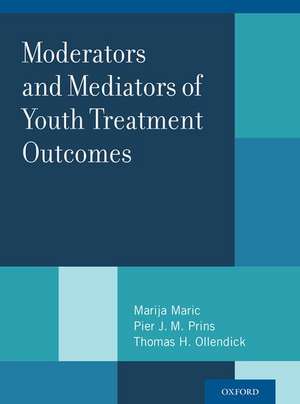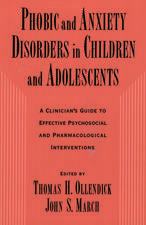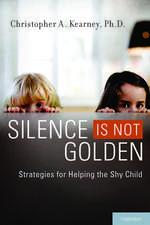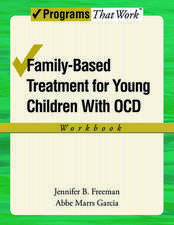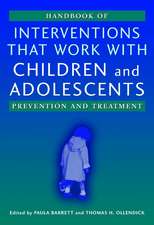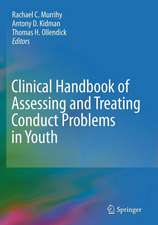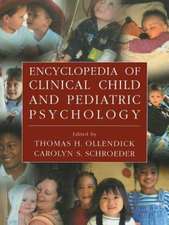Moderators and Mediators of Youth Treatment Outcomes
Editat de Marija Maric, Pier J.M. Prins, Thomas H. Ollendicken Limba Engleză Hardback – 27 aug 2015
Preț: 561.08 lei
Preț vechi: 764.57 lei
-27% Nou
Puncte Express: 842
Preț estimativ în valută:
107.36€ • 112.38$ • 89.36£
107.36€ • 112.38$ • 89.36£
Carte tipărită la comandă
Livrare economică 20-26 martie
Preluare comenzi: 021 569.72.76
Specificații
ISBN-13: 9780199360345
ISBN-10: 0199360340
Pagini: 328
Dimensiuni: 236 x 163 x 31 mm
Greutate: 0.72 kg
Editura: Oxford University Press
Colecția OUP USA
Locul publicării:New York, United States
ISBN-10: 0199360340
Pagini: 328
Dimensiuni: 236 x 163 x 31 mm
Greutate: 0.72 kg
Editura: Oxford University Press
Colecția OUP USA
Locul publicării:New York, United States
Notă biografică
Marija Maric, PhD, is Assistant Professor of Clinical Developmental Psychology in the Department of Developmental Psychology at the University of Amsterdam (The Netherlands). Dr. Maric conducts studies on moderation and mediation in the area of youth anxiety disorders and youth with comorbid anxiety disorders and ADHD. Dr. Maric also works as a cognitive behavior therapist at UvA Minds, an Academic Treatment Center for Children and Parents.Pier J.M. Prins, PhD, is Professor of Clinical Child Psychology in the Department of Developmental Psychology at the University of Amsterdam (The Netherlands). Over the past decade he has been involved in several large-scale, multi-site treatment-outcome projects dealing with childhood social problems, ADHD, and anxiety problems. He is also a licensed child cognitive behavior therapist.Thomas H. Ollendick, PhD, is University Distinguished Professor in Clinical Psychology and Director of the Child Study Center at Virginia Polytechnic Institute and State University. He is founding and current Co-Editor of Clinical Child and Family Psychology Review. The recipient of several NIMH grants, his clinical and research interests range from the study of diverse forms of child psychopathology to the assessment, treatment, and prevention of these child disorders from a social learning/social cognitive theory perspective.
